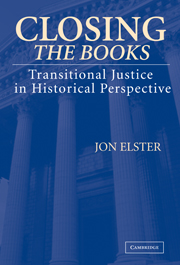7 - Constraints
Published online by Cambridge University Press: 17 November 2009
Summary
INTRODUCTION
In the present chapter, I consider how the modalities of transition may constrain the substantive and procedural decisions of transitional justice. In some cases, they do so by making some options absolutely unfeasible (“hard constraints”). More frequently, they do so by affecting the trade-offs between justice and other goals, such as economic reconstruction or survival of the new regime (“soft constraints”).
I shall proceed as follows. In Section II, I discuss how transitional justice may be constrained by the negotiations that establish the new regime. In Section III, some aspects of transitional justice in Germany in 1945 are considered in some detail. In section IV, I discuss economic constraints on transitional justice. I conclude in section V by considering the tension between various desiderata of transitional justice that may make it impossible to satisfy all of them at the same time.
THE CONSTRAINTS OF NEGOTIATED TRANSITIONS
The leaders of an incoming regime may not be free to implement transitional justice as they please, if the transition was ushered in by negotiations that included provisions of amnesty or clemency. In fact, it is hard to see why outgoing leaders would ever relinquish power voluntarily unless they were assured that their persons, and preferably their property, were secure. The main question of the present section concerns the basis of that assurance. Although I focus on twentieth-century negotiated transitions, I begin with some earlier cases.
- Type
- Chapter
- Information
- Closing the BooksTransitional Justice in Historical Perspective, pp. 188 - 215Publisher: Cambridge University PressPrint publication year: 2004



